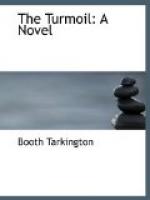“All ri’,” Roscoe murmured, obediently.
They went out into the main hall by a side door, not passing through the outer office; and Sheridan waited for an empty elevator, stopped it, and told the operator to take on no more passengers until they reached the ground floor. Roscoe walked out of the building and got into the automobile without lurching, and twenty minutes later walked into his own house in the same manner, neither he nor his father having spoken a word in the interval.
Sheridan did not go in with him; he went home, and to his own room without meeting any of his family. But as he passed Bibbs’s door he heard from within the sound of a cheerful young voice humming jubilant fragments of song:
Who looks a mustang in the eye?...
With a leap from the ground
To the saddle in a bound.
And away—and
away!
Hi-yay!
It was the first time in Sheridan’s life that he had ever detected any musical symptom whatever in Bibbs—he had never even heard him whistle —and it seemed the last touch of irony that the useless fool should be merry to-day.
To Sheridan it was Tom o’ Bedlam singing while the house burned; and he did not tarry to enjoy the melody, but went into his own room and locked the door.
CHAPTER XIX
He emerged only upon a second summons to dinner, two hours later, and came to the table so white and silent that his wife made her anxiety manifest and was but partially reassured by his explanation that his lunch had “disagreed” with him a little.
Presently, however, he spoke effectively. Bibbs, whose appetite had become hearty, was helping himself to a second breast of capon from white-jacket’s salver. “Here’s another difference between Midas and chicken,” Sheridan remarked, grimly. “Midas can eat rooster, but rooster can’t eat Midas. I reckon you overlooked that. Midas looks to me like he had the advantage there.”
Bibbs retained enough presence of mind to transfer the capon breast to his plate without dropping it and to respond, “Yes—he crows over it.”
Having returned his antagonists’s fire in this fashion, he blushed— for he could blush distinctly now—and his mother looked upon him with pleasure, thought the reference to Midas and roosters was of course jargon to her. “Did you ever see anybody improve the way that child has!” she exclaimed. “I declare, Bibbs, sometimes lately you look right handsome!”
“He’s got to be such a gadabout,” Edith giggled.
“I found something of his on the floor up-stairs this morning, before anybody was up,” said Sheridan. “I reckon if people lose things in this house and expect to get ’em back, they better get up as soon as I do.”
“What was it he lost?” asked Edith.
“He knows!” her father returned. “Seems to me like I forgot to bring it home with me. I looked it over—thought probably it was something pretty important, belongin’ to a busy man like him.” He affected to search his pockets. “What did I do with it, now? Oh yes! Seems to me like I remember leavin’ it down at the office—in the waste-basket.”




